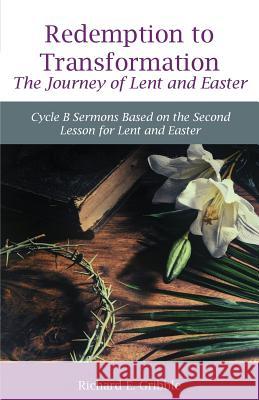Redemption To Transformation The Journey of Lent and Easter: Cycle B Sermons Based on the Second Lesson for Lent and Easter » książka
Redemption To Transformation The Journey of Lent and Easter: Cycle B Sermons Based on the Second Lesson for Lent and Easter
ISBN-13: 9780788028878 / Angielski / Miękka / 2017 / 116 str.
Redemption To Transformation The Journey of Lent and Easter: Cycle B Sermons Based on the Second Lesson for Lent and Easter
ISBN-13: 9780788028878 / Angielski / Miękka / 2017 / 116 str.
(netto: 56,87 VAT: 5%)
Najniższa cena z 30 dni: 59,22
ok. 16-18 dni roboczych.
Darmowa dostawa!
If the Lenten journey is traversed successfully, then we can fully enter into the celebratory time of Easter. Yet, even as we observe these events we must acknowledge that the challenges of the Christian life are ever present. We should never forget British writer G.K. Chesterton's admonition in What's Wrong with the World (1910), "The Christian life has not been tried and found wanting; it has been found difficult and left untried." The Easter season reminds us that despite the triumph of Christ there will always be challenges to our belief. We seemingly cannot believe unless we see; yet we know that faith often is beyond proof and, thus, beyond sight as well. We are also challenged to discover ways of transforming problematic situations and what appears to be defeat into triumph through the grace of God. Additionally, this great season of grace teaches us that we must continually evaluate what we do and keep our eyes fixed on Christ and his mission and message. Finally, as Jesus ascends to the Father, we come to realize that the Lord's work in not complete and, therefore, each day presents us with the opportunity to do something to complete the master's work. The cycle B second lesson sermons of Reverend Richard Gribble's Redemption to Transformation: The Journey of Lent and Easter represent an understanding of the challenges presented us through this highly significant and very special journey. The church in its wisdom gives us this opportunity annually to review where we are and, after ascertaining our present position, the challenge to move to higher realms that are more consistent with our common Christian call to holiness. It is hoped that these reflections will be helpful to you as together we travel the path from Lent to Easter, and eventually to Christ and eternal life. Redemption to Transformation: The Journey of Lent and Easter provides a second lesson sermon for every Sunday of cycle B, which will provide the following advantages:
- To give busy pastors ideas for their sermon creation
- To make the day-to-day life of being a pastor easier
- To free up time for counseling, visitation, or just your own leisure
- Suffering Leads to Victory (1 Peter 3:18-21)
- Enduring the Trails of Faith (Romans 4:13-25)
- The Cost of Discipleship (Philippians 2:5-11)
- Sacrifice Leads to Life (Hebrews 10:16-25)
- Rising to New Life (1 Corinthians 15:1-11)











